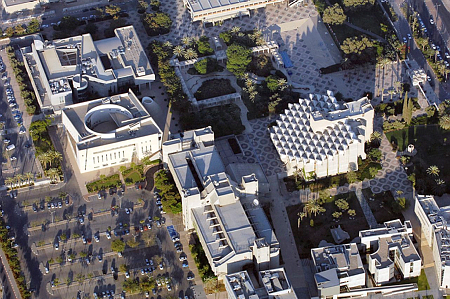High Tech Flourishes in the Negev
Written by Yona Schnitzer/TPS on March 09, 2018
A growing High-Tech community in Be’er Sheva is paving the way for the southern capital of Israel to become not just a national leader of innovation, but a global one as well.
In 2013, the first building in the Gav-Yam Advanced Technologies Park in Be’er Sheva was inhabited. The park was built right outside the campus of, and in conjunction with Ben Gurion University, with the vision of creating a local ecosystem for startups and high tech companies, while making use of the collective brain power coming out of BGU. The park is also adjacent to the site which is set to become the IDF’s future Technology Campus, where the military plans on consolidating its various cyber and technological units.
Five years later, the Gav-Yam park is home to nearly 2,000 employees working for 70 different high tech companies, including local branches of multinational corporations such as Paypal, Dell EMC and Deutsche Telekom. In January 2015, Brandeis International Business School named Be’er Sheva as the first among seven cities poised for significant growth in technology and life sciences.
The Technologies Park continued to flourish, and in early 2015, welcomed a new player, Tech7, into its growing community. Established by a group of young BGU students and graduates alongside industry figures, Tech7 is an umbrella organization aiming to bring together different startups and entrepreneurs, creating synergy between them and promoting support of local technology initiatives. Tech7 set out to unify the technological-entrepreneurial community in Be’er Sheva and turn the southern city into Israel’s leading technology ecosystem. The organization hosts meetups, competitions and various other events aimed at cultivating the local high tech community.
On Wednesday, Tech7 hosted a delegation of international journalists, who were presented with some ambitious projects being developed by some of the community’s most promising startups.
First was HC Vision – a startup company that develops methods of maximizing the potential of censors located in cell phone cameras. Using the slogan ‘The $50,000 camera you already own’, HC Vision’s technology allows a standard phone camera to increase spectral resolution and capture information over a wide range of wavelengths without the need for specialized equipment or controlled lighting, thus allowing for various advanced applications such as facial recognition, material sensing and operating in low light conditions.
“Our technology increases light sensitivity by over 100%, and we can allow real chemical composition information to be gathered from the image and do many interesting things with it, such as food analysis and object detection,” said HC Vision founder Boaz Arad, while demonstrating how the system can differentiate between a picture of a person, and a photograph of a picture of a person – a fix that is in high demand due to the fact that many cellphones that are unlocked using facial recognition can be easily tricked using a picture of the phone’s owner, rather than the actual person. The scenario played out recently with Apple’s Iphone X, which offered facial recognition that hackers were able to hack within two weeks of the phone’s release. The method being employed by HC makes use of the camera sensors to detect whether the object in front of them is made from organic material or another material such as rubber or paper, thus allowing the phone to differentiate between an actual face and a mask or a photograph.
Another presentation was made by Echo Care, a firm which is developing an elderly care home observation system that employs radar technology developed by Elbit Systems in order to determine if an elderly person is in a state of distress of danger, or has fallen down – a common catalyst to many medical complications with the elderly. The system, which can be installed in any home or assisted living facility tracks the movements of the subject, as well as their respiration and other factors, and cross references those different bits of information in order to determine whether the subject is in actual distress. Many existing products in the category are known for triggering false alarms. Echo Care says the difference between its system and others is the ability to determine the nature of a fall and whether or not it was severe. This revolutionary application of existing radar technology is also effective in preventive care, in addition to emergency care, as it can detect if a subject is breathing heavily or is moving around in an abnormal state, in which case it alerts the operator that the subject is in danger of falling down.
Another potentially revolutionary healthcare product being developed in Be’er Sheva’s high tech park is Consis Medical’s semi disposable colonoscopy kit, which does away with the tube camera traditionally used in such procedures, and replaces it with a partially disposable pill-cam system that is guided through the intestine using an inflatable balloon. While the traditional colonoscopy method involves using a long tube, which is reused and must be thoroughly sterilized between uses – a feat which is difficult with large medical products, not to mention time consuming, the Consis system only reuses the tiny pill cam, while the ballon system, which acts as the tube, is disposable.
It was Israel’s first Prime Minister, David Ben Gurion, – BGU is named after him – who envisioned the Negev desert as the future of Israel, calling upon the masses to “make the desert bloom”, before he himself retired to the southern kibbutz of Sde Boker. “It is in the Negev that the creativity and pioneer vigor of Israel will be tested,” said Ben Gurion.
In 2018, it cannot be more apparent that he was definitely on to something.
